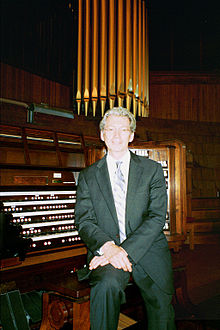- Gordon Turk
-
Gordon Turk 
Gordon Turk at the Ocean Grove (NJ) Auditorium organBorn New Jersey, U.S. Occupation organist, composer Gordon Turk is a prominent American concert organist. He has played throughout the United States, made two concert tours in Japan, and performed frequently in Europe, including the Ukraine and Russia, both as solo organist and with orchestra.
Contents
Early years and education
The son of a Methodist minister in New Jersey, Turk began piano studies at age five and then organ when he was ten years old. He graduated from the Curtis Institute of Music, where he studied piano and organ. He also studied with New York composer and organist McNeil Robinson at the Manhattan School of Music in New York City, earning the Master's degree and the Doctor of Musical Arts, both with honors.[1] He is a former Professor of Organ at West Chester University of Pennsylvania (1992–1999).
Professional career
Turk is particularly well-known as resident organist of the Great Auditorium in Ocean Grove, New Jersey.[2] Since he took this post in 1974, the famed Robert Hope-Jones organ has been expanded to include 10,823 pipes (176 ranks) and enriched with a remarkably diverse tonal palette.[2] Besides playing for weekly Sunday services, Turk offers solo recitals (along with guest concert organists) in the Auditorium on most Wednesdays and Saturdays in July and August. Turk has described the Auditorium organ as unique, saying "I know it when I hear it, even a recording on the radio."[3]
He also serves as artistic director of the acclaimed "Summer Stars Classical Series" held there on Thursday evenings.[4] On July 3, 2008, Turk presented the Organ Centennial Concert as part of the Summer Stars Classical Series to celebrate the 100th anniversary of the organ's dedicatory recital on July 3, 1908.[5] In May 2006, he was one of the first organists to perform on the newly-installed Fred J. Cooper Memorial Organ in Philadelphia's Kimmel Center for the Performing Arts. The previous year, he gave a recital on the Wanamaker organ in Philadelphia, the largest functioning musical instrument in the world.
He has also appeared in concert as a harpsichordist, pianist, and conductor (choral and orchestral). As a composer, he has written compositions for string orchestra, woodwinds, organ, piano, voice and chorus. In January 2000, his composition Elegy for string orchestra and oboe was performed live on television in Japan.
Turk is also organist and choirmaster of St. Mary's Episcopal Church in Wayne, Pennsylvania.[6]
Awards and honors
Turk has received the John Cerevalo Prize for "Excellence in the Performance of the Music of Johann Sebastian Bach". He also has been a prize-winner in the national improvisation competition of the American Guild of Organists.[1]
Recordings
In addition to being featured on such radio programs as Pipedreams and Sacred Classics, as well as Philadelphia-area broadcasts, Turk has released compact disc recordings, including:
- Ocean Grove – French Spectaculars on the Great Ocean Grove Auditorium Organ
- Organ Echoes – Sacred Classics
- Organ in the Grand Tradition
References
- ^ a b Gordon Turk's biography (2001). Organ Echoes – SacredClassics (CD). Atlas Communications.
- ^ a b Lawrence Van Gelder (1998-07-30). "Footlights". The New York Times. http://query.nytimes.com/gst/fullpage.html?res=9902E7DE1538F933A05754C0A96E958260&scp. Retrieved 2008-06-03.
- ^ Stearns, David Patrick (July 20, 2008). "The grand old pipe organ of Ocean Grove". The Philadelphia Inquirer: p. H1.
- ^ Leslie Kandell (1998-07-26). "Music: The Heart of a Shore Community". The New York Times. http://query.nytimes.com/gst/fullpage.html?res=9806EFD81539F935A15754C0A96E958260&scp. Retrieved 2008-06-03.
- ^ "Summer Stars Classical Series presents an Organ Centennial Concert" (program), July 3, 2008.
- ^ St. Mary's Episcopal Church.
External links
- Gordon Turk – official website
- Gordon Turk interview and music on Sacred Classics
- Ocean Grove Camp Meeting Association – official website
Categories:- American classical organists
- Living people
Wikimedia Foundation. 2010.
